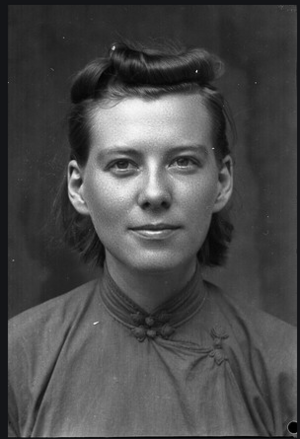Isabel Crook facts for kids
Quick facts for kids
Isabel Crook
|
|||||||
|---|---|---|---|---|---|---|---|
 |
|||||||
| Born | 15 December 1915 Chengdu, Sichuan, China |
||||||
| Died | 20 August 2023 (aged 107) Beijing, China |
||||||
| Occupation | Professor, anthropologist | ||||||
| Language | English, Chinese | ||||||
| Nationality | Canadian British |
||||||
| Alma mater | University of Toronto London School of Economics |
||||||
| Notable works | Xinglong Chang: Field Notes of a Village Called Prosperity 1940-1942 Revolution in a Chinese Village: Ten Mile Inn |
||||||
| Notable awards | Medal of Friendship (2019) | ||||||
| Spouse | |||||||
| Children | 3 | ||||||
| Relatives | Homer G. Brown (father) Muriel J. Hockey (mother) |
||||||
| Chinese name | |||||||
| Traditional Chinese | 饒素梅 | ||||||
| Simplified Chinese | 饶素梅 | ||||||
|
|||||||
Isabel Crook (Chinese: 饶素梅; pinyin: Ráo Sùméi; born December 15, 1915 – died August 20, 2023) was a Canadian professor and expert in human cultures (an anthropologist). She taught at Beijing Foreign Studies University in China. She was known for her teaching, research, and for living through a major historical period in China called the Cultural Revolution.
Contents
Early Life and Studies
Isabel Crook was born in Chengdu, Sichuan, China, on December 15, 1915. Her parents, Homer and Muriel Brown, were Canadian missionaries. Missionaries are people who travel to other countries to share their beliefs and often help local communities.
Isabel's father was a dean at a university, and her mother started special schools for young children. From a young age, Isabel became very interested in anthropology. This is the study of human societies and cultures. She was especially curious about the many different ethnic minorities in China.
When she was 23, Isabel graduated from the University of Toronto in Canada. After that, she began her own field research. This means she traveled to places like Li County in Sichuan Province to study people's lives and cultures firsthand.
Career, Marriage, and Chinese History
In the early 1940s, Isabel met David Crook. They got married in 1942. Together, they shared an interest in understanding social changes in China.
In 1947, Isabel and David went to a village called Ten Mile Inn in Hebei Province. They wanted to observe and study a big change happening there: the Chinese Land Reform. This was a movement where land was taken from wealthy landowners and given to farmers.
Six months later, leaders in China invited them to teach at a new school. This school later became the famous Beijing Foreign Studies University (BFSU). As a teacher at BFSU, Isabel Crook helped create the way foreign languages are taught in China today.
During a period called the Cultural Revolution (from 1966 to 1976), life in China changed a lot. David Crook was held in a prison for several years. Isabel Crook was kept on the BFSU campus. Even though this was a difficult time, Isabel Crook later said she understood and forgave those involved.
In June 2019, she was made an honorary citizen of Bishan District, Chongqing. This means she was given special recognition by the local government.
Personal Life and Legacy
Isabel Crook and her husband, David, had three sons. She lived a very long life, passing away in Beijing on August 20, 2023, at the age of 107. Her work helped many people understand Chinese society and history.
Major Books
Isabel Crook wrote important books based on her research:
- Xinglong Chang: Field Notes of a Village Called Prosperity 1940-1942 (兴隆场:抗战时期四川农民生活调查(1940-1942))
- Revolution in a Chinese Village: Ten Mile Inn (十里店:中国一个村庄的革命)
Awards and Recognition
On September 30, 2019, Isabel Crook received a very special honor. She was given the Medal of Friendship by Chinese president Xi Jinping. This award is given to foreigners who have made great contributions to China.
See also
 In Spanish: Isabel Crook para niños
In Spanish: Isabel Crook para niños
 | Aaron Henry |
 | T. R. M. Howard |
 | Jesse Jackson |

